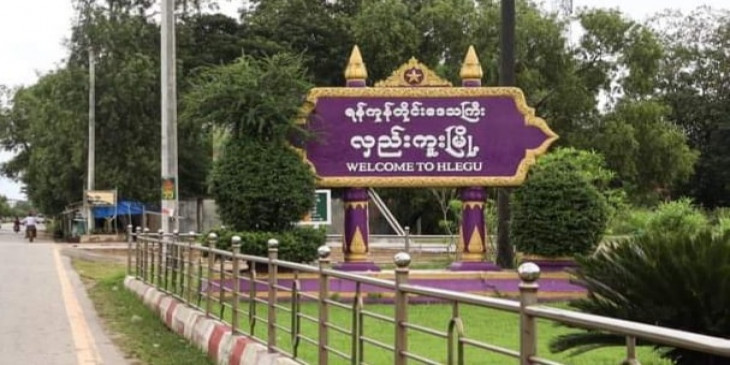
Residents of Hlegu have announced that they have formed an Interim’s People Administration for the northern Yangon township.
According to a release on social media, the group consists of local people, members of parliament, PDF and People’s Security Force members, CDM civil servants, and Helgu Student Union. The group has been formed in accordance with guidelines laid down by Burma’s National Unity Government (NUG).
On October 16, Hlegu PDF had threatened all 57 military appointed administrators to resign or face repercussions.
The PAF is the second independent administration to form in Yangon Region. On October 12, Kayan township, an agricultural region to the far east of Yangon, took what could prove to be a notable step in the timeline of Burma’s people’s revolution: it announced its administrative independence from the military.
Immediately after usurping power on February 1, the junta replaced every administrator in the country with people, usually drawn from the USDP party, sympathetic to the military. Previous administrators held their position through their connection to a township or village, usually through reputation, historical links and business relations and not necessarily for political reasons.
These military-appointed administrators, in turn, offered newly formed civilian defense forces extremely obvious and visible targets for attacks. As of October, independent researchers Data for Myanmar document that at least 366 military-appointed administrators have resigned. Scores more have been assassinated. Three townships account for the vast majority of these resignations: Tigyaing in Sagaing, Yesagyo in Magway, and Yangon’s Kayan township.
According to an October 14 statement of the newly formed Interim People’s Administration of Kayan, the group was formed following the “complete cessation” of the junta’s administrative machinery. By mid-October, it reports, all 65 of the townships administrators had left their posts in the face of increasing aggression from local PDF groups. Because of this, Kayan PAF wrote, “military administration has been 100 percent suspended”, and a civilian administration was “proudly welcomed” by residents of Kayan.
“It is the first township in Yangon region where all military junta-appointed administrators have resigned, and the goodwill of the people has made history,” they said.
“We founded the PAF in accordance with the NUG Government’s guidelines. The group existed as part of the Kayan PDF, but has been reformed to include not only PDF volunteers but also local leaders, CDM participants, activists, lawyers, and members of Parliament from the CRPH,” a Kayan PAF member, who was also active in the township’s PDF, told DVB.
The group has said that, following the formation of the People's Administration, stability in Kayan has somewhat returned, and, most evidently, residents were no longer being forced to submit household registrations and visitor recommendation letters to administrators and police stations, information that had formed the basis of many recent raids, abductions, and lootings by the military.
“Currently, we will operate as a hidden system; we still need to keep a low-profile because of security reasons. However, we will appoint local administrators in the village. If one of our administors is uncovered by the Junta, we will send them to a safe place,” the PAF member said.
The representative of Kayan PAF says that the group is currently reliant entirely on public donations. The NUG have previously expressed that they will support PAFs, yet the group says it is yet to receive central funding.
There are currently official Facebook pages of Interim People’s Administrations for Kayan township in Yangon region, Hinthada in Ayeyarwady region, Kyaukpadaung in Mandalay region, and Depayin in Sagaing region. The Saw region also recently announced the formation of a PAF, in what is currently one of the country’s most dangerous theatres of battle.
Nine townships in Chin State established independent public administrations early on in the coup with the support of the Chin National Army. A spokesperson for the Mindat Public Administration told DVB that, after forming in February, it is now one of the most functional administrations in the whole of Chin State.
“I would say our public administration group is very active and progressing well. It was founded entirely from scratch and independently; all of the members took up their own responsibilities without leaders. Later on, in June, we updated the operations of the group in accordance with the Chin Ethnic Law,” Mindat PA’s spokesperson told DVB.
Mindat Public Administration has also been able to add new functions to its independent township administration, and now possesses a chairman, security and treasurer in agencies responsible for the township’s judicial, defense, education, finance, business, and information matters.
“We have our own administrators for each sector. We don’t have a police group yet but our defense group takes responsibility for crime in the township. There are about 70 villages in Mindat and each village has ‘people’s administrators’. We also have a CDM Judge for the judiciary,” he said.
In Mindat, a junta administration has never taken root, despite the presence of troops stationed downtown.
Mindat PAF says it has connections with the NUG, and has already received a degree of support from it; not only on matters of policy, but also financial backing. However, the group admits that, currently, it can only function due to donations from the local populace.


